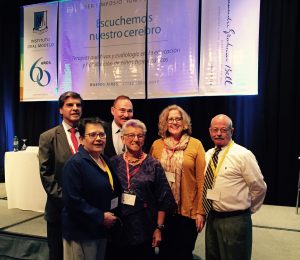Executive Functions are the set of mental skills that help you get things done like take notes in class, manage time, or knock out a to-do list (click here for a more detailed explanation). Children with Hearing Loss Research has shown that students with hearing loss, even those who are remarkably successful in language and literacy, often show marked delays in Executive Function. This puts them at risk in school, work, and personal achievement. It calls us to question whether these deficits are the result of a lack of auditory access, or if parents and professionals perpetuate the delays through our teaching approaches.
Teri along with fellow presenters Jane Madell, Don Goldberg, Sharon Sandridge, Emilio Alonso-Mendoza (AG Bell) and Percy Denham (sponsor – Instituto Oral Modelo)
EF skills are based on the development of the Prefrontal cortex, and just as we are concerned with the development of the auditory cortex, it’s necessary for us to directly address these issues early and throughout each child’s education. We believe that Listening & Spoken Language (LSL) professionals are in a unique position to assess and address EF development, especially at young ages, because of our approach to early intervention and our direct influence on parenting practices. At a conference in Buenos Aires, we will examine as a community the components of Executive Function, look at their relationship to communication as a whole and audition in particular, and look for ways we can utilize best practices in LSL to advance Executive skills. Building Self Advocacy through Auditory Function Auditory Functioning may be the most significant of the nine domains of the Academy for Listening and Spoken Language. It involves more than just the building blocks of detecting and identifying sounds, words, or sentences. It implies a level of integration of listening skills into communication, processing, self-awareness, and the management of daily life. [blockquote type=”left”]”There is a strong connection between a child’s auditory function and their ability to identify, assess, and advocate for their needs in their environment – in class, in their family, and in social interactions. This connection forms a circular process of self-awareness, self-assessment, and self-advocacy that allows a child to “own” their hearing and communication.” Teri Ouellette, President of SJI[/blockquote] Our presentation will examine how Listening and Spoken Language professionals can identify and utilize opportunities for children to advance their skills at each stage of their auditory and social development.
Keep checking here for more resources!

